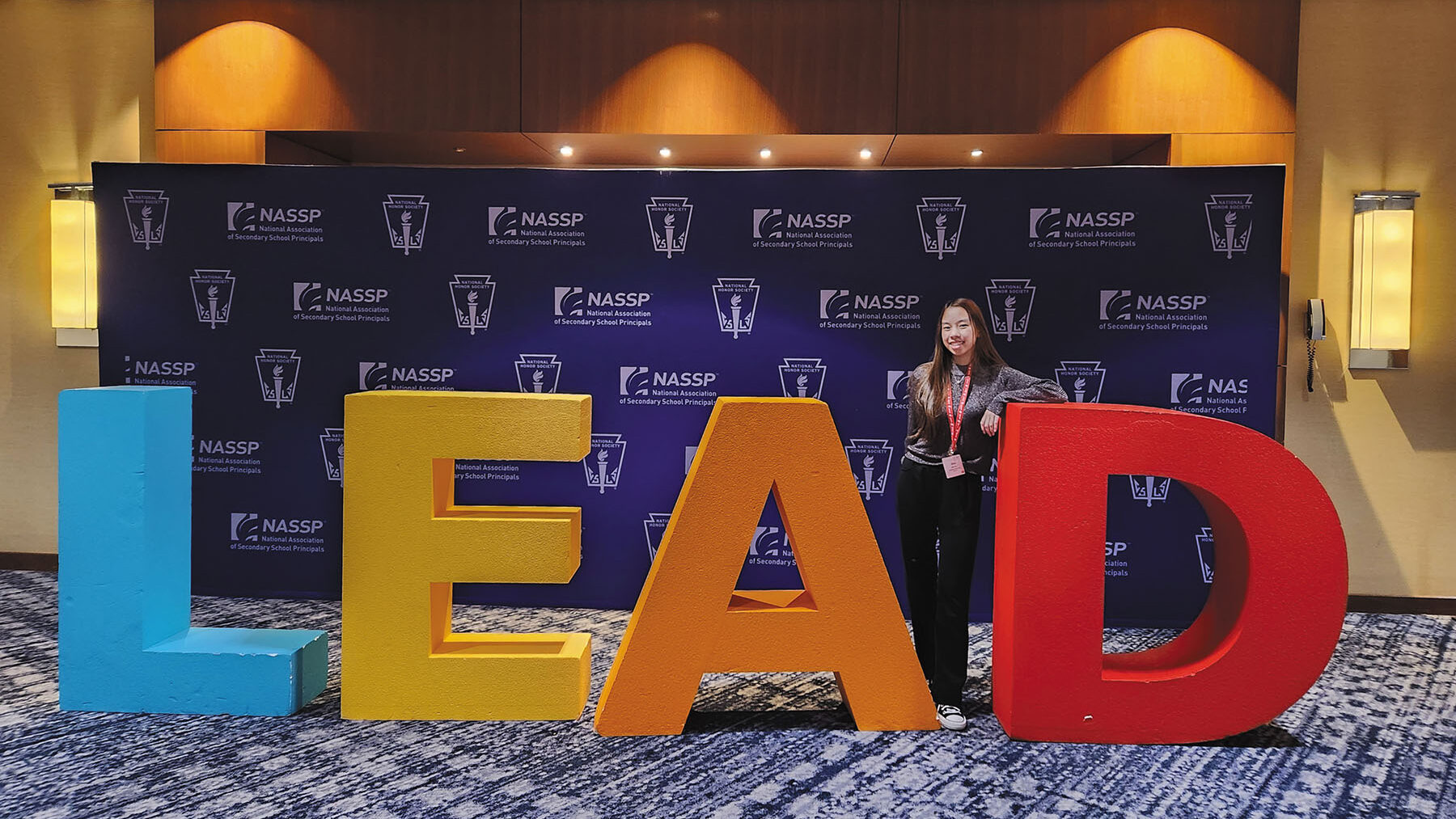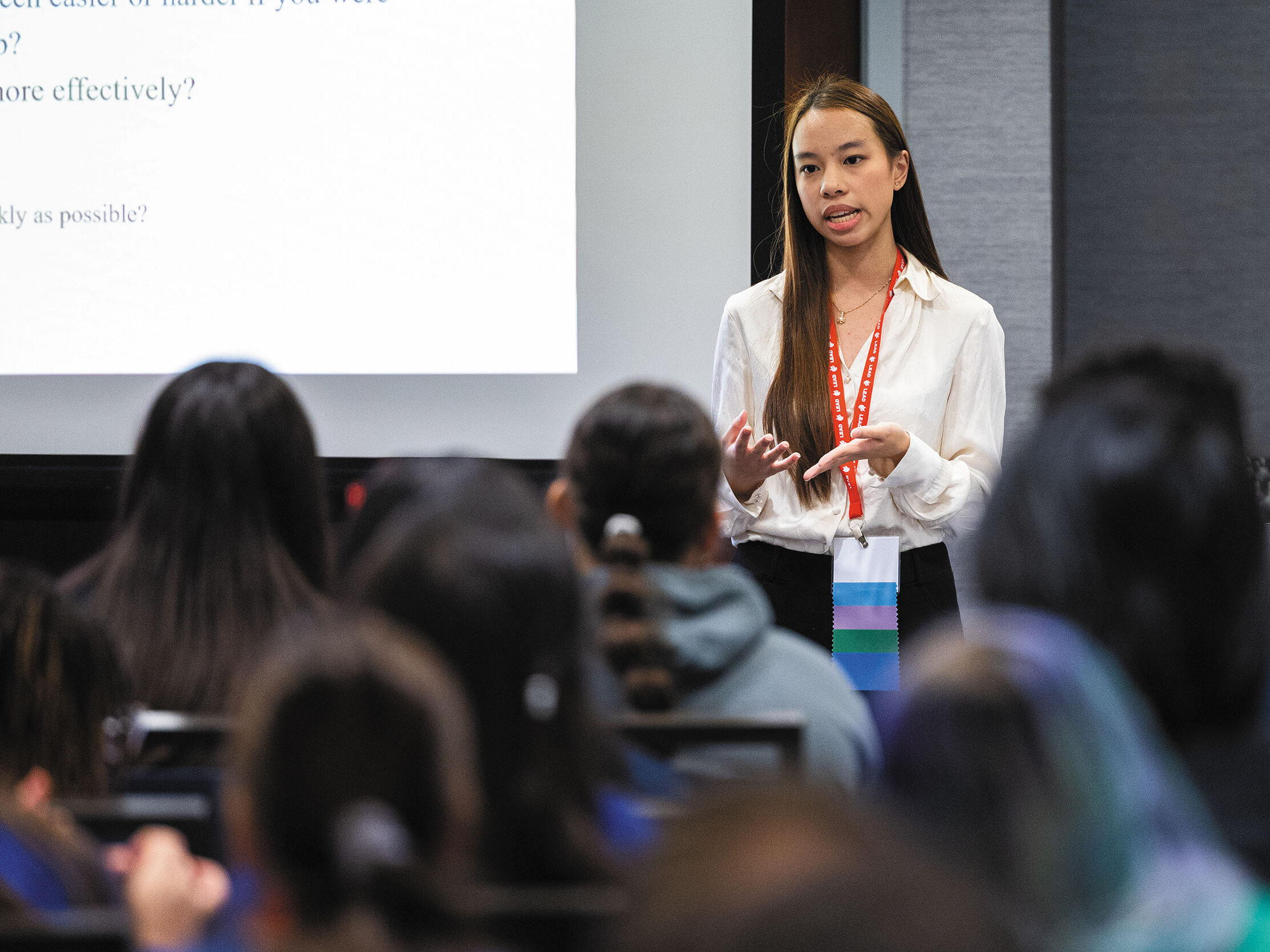Student Centered: March 2024

“You are like an arrow: someone who strives toward your goals while inspiring and helping others reach theirs.”
Of all the interactions throughout my leadership journey, this peer’s comment from NASSP’s LEAD Conference in November most deeply resonated with me.
Two prominent experiences have been crucial to shaping the leader I am today: the LEAD Conference, where I served as an NASSP Ambassador, and the New Jersey Association of Student Councils (NJASC) Leadership Training Conference (LTC), which I organized as the New Jersey Student Council vice president. State, regional, and national conferences are paramount for students because they offer indispensable opportunities to broaden our perspectives. As students, we often stagnate in our local communities because adhering to established systems is far less taxing than implementing change. When exposed to individuals and schools of thought from various backgrounds, we see the possibilities of innovation and are reinvigorated to implement the new ideas, even if it means leaving behind systems of comfort.
Beyond these two milestone projects, I have experienced many awe-inspiring moments, from watching my high school community gather together for a Relay For Life event I organized as NHS president, raising over $15,000 for the American Cancer Foundation, or witnessing the collective impact of New Jersey students as I unveiled a $90,000 donation to the state charity I selected as NJASC vice president. However, these moments are incomparable to the sense of accomplishment that arises from fostering the growth
of others.
Servant Leadership
While conferences like LEAD and LTC serve as platforms to exchange ideas and perspectives for participants, they hold personal significance for organizing officers, like myself. Spending sleepless nights creating workshops on effective communication and collaboration that would later be presented to my peers, delivering a keynote on the power of persistence, and interacting with peers through conversations and forging meaningful friendships was a remarkable privilege. Watching a community of incredibly diverse individuals from different states and backgrounds confer on ways to strengthen student leadership and ultimately become better leaders is incredibly rewarding when you know you have personally contributed to their growth. With each blossoming smile and interaction, I know I have done something worthwhile for myself and others.
More importantly, I have learned that service is not about standing in front of the room but leading others from the sidelines. While titles such as NHS president and Student Council officer are satisfying attainments, a person’s true value derives from their actions and how they impact and inspire others. It’s not how long an individual spends at the microphone but the substance they put into their remarks. It’s not about taking pride in opening doors but inspiring others to walk through them.

Every year, NJASC requires each state officer to select a leadership quote representing their personal leadership philosophy as the keystone of their inauguration into office. This philosophy guides our actions and dictates the legacies we create throughout our term.
As the 2023 New Jersey vice president, I selected a quote from Jack Welch, the former CEO of General Electric: “Before you are a leader, success is all about growing yourself. When you become a leader, success is all about growing others.” This is a leadership creed I have grown to embody, and I hope others can discover it through their own leadership journey.
The Small Moments of Growth
While peers may view me as a leader, I’ve personally struggled with something seldom associated with leadership: social anxiety. Social anxiety stems from paralyzing anxiety that interferes with relationships and everyday social interactions. Diagnosed in preschool, I had my first panic attack at age three while other kids in my class sipped juice boxes contentedly. The bewildering shaking and frightening panic I would experience throughout my childhood even prevented me from responding to teachers when they asked me simple questions like my name. Bathroom stalls became crying havens when I was forced to present about my favorite animal. In any social setting, I battled my emotions before giving in to the inevitable terror of my body shutting down. Ultimately, I felt unable to participate in the social systems of the world.
How does an individual with social anxiety, incapable of communicating, transform into becoming the representative voice of her peers? The answer lies in something we all have the power to leverage: the small moments of our everyday life.
One of my most vivid realizations occurred while sitting at a local student council convention, contemplating the “golden trait” distinguishing officers from regular participants. How had I, someone who used to tremble under direct eye contact, found my way to becoming a state and national officer?
As I reflected, I realized that the little moments accumulate into something bigger. Those brief moments when you raise your hand to share your ideas, ask a question, or call out a response during a keynote address matter. The emails you send and the minutes you create while planning local projects are formative to becoming a better leader. These experiences serve as building blocks for you to eventually take a more active part in the community. Going a bit further by presenting your own workshop, taking on small responsibilities, and running for an executive position, are what set a leader apart. These moments may seem inconsequential, but in the long run, they provide opportunities for you to be more courageous, develop confidence in yourself, take the next step, and dream a little bigger. Before you know it, you’ll have gone further than you could have imagined. Whether it means volunteering at an event, joining your school’s student council, or taking the initiative to turn your own ideas into reality, I implore you to take the first step.
I hope school leaders reading my words share them with their students—those who already lead and those who have the potential to do so. What does the word “leader” mean to you? Perhaps a political leader, such as an influential president or a historical figure who has catalyzed monumental change, comes to mind. Maybe you think on a smaller scale, and a family member or peer with whom you’ve fostered a personal connection serves as your leader.
Through my leadership journey, I have discovered that leadership resides in everyone and is not limited to the person standing on stage or presenting a workshop. We are all leaders. Some are more prominent than others. Some stand in the front, while others lead from the sidelines. Regardless, we are all capable of creating change in our communities. Having developed my own definition of leadership, I hope that you will join me in discovering what leadership means to you and serve as a changemaker for our generation of student leaders.
Alina Chen is a senior at East Brunswick High School in East Brunswick, NJ, and the vice president of the New Jersey Association of Student Councils. She is also a National Student Council Marketing Ambassador for NASSP.
